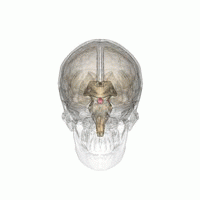
Today we discussed a very interesting case of a 60M with pituitary apoplexy.
Pituitary apoplexy is hemorrhage, infarct, or both, of an underlying pituitary adenoma (less often a nonadenomatous gland) that results in ischemia and ultimately necrosis. The presentation can include: headache, nausea, vomiting, and ophthalmoplegias. The latter can include ptosis/dilated pupil/down and out eye (CN III), vertical diplopia (CN IV), and infrequently horizontal diplopia (CN VI). Visual field defects from expansion and compression of the optic chiasm can also occur. Subarachnoid bleeding can cause altered mental status and even coma.
Predisposing factors include: trauma, presence of an adenoma, hypotension, hypertension, previous pit irradiation, postsurgical, cardiac surgery, anticoagulation, treatment with dopamine agonists (ie bromocriptine), pituitary stimulation tests, and pregnancy (ie Sheehan's syndrome).
Differential diagnosis should include: SAH, meningitis, brainstem infarct, cavernous sinus thrombosis, migraine, Rathke's cleft cyst hemorrhage. If the presentation is primarily one of adrenal insufficiency, the other causes of adrenal insufficiency must be considered, and primary AI must be differentiated from secondary. See here for my previous post on adrenal insufficiency with links to a review article.
Once the pituitary has infarcted, pituitary function becomes impaired. This includes the production of ADH, oxytocin (posterior pituitary), and LH, FSH, TSH, GH, PRL, ACTH (anterior pituitary). Most important immediate concerns are the CRH-ACTH-cortisol axis, and IV hydrocortisone is required. Electrolytes must be closely monitored as patients may be hyponatremic, but the impaired ADH secretion can lead also to diabetes insipidus leading to brisk diuresis and hypernatremia. Patients will likely also need thyroid replacement. In secondary adrenal insufficiency (which this is), fludricortisone is typically not needed.
Workup includes MRI (sellar), electrolytes, urine lytes, TSH, PRL, other hormonal workup including LH, FSH, IGF-1, and AM cortisol (only helpful if it is very low). Cosyntropin stimulation test is only helpful when abnormal - if you have a high pretest probability, you would need more sensitive integrated hormonal tests.
No comments:
Post a Comment